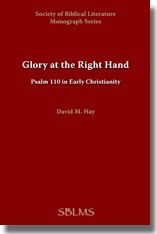SBL Press Bookstore

Glory at the Right Hand: Psalm 110 in Early Christianity
David M. Hay
ISBN
9781589831902
Volume
SBLMS 18
Status
Available
Price
$22.00
Publication Date
December 2005
$22.00
Verses 1 and 4 of Psalm 110 are among the Jewish scriptures most often quoted by the early Christian writers, with no less than thirty-two references and allusions recorded in the New Testament. Yet this book is one of the few systematic analyses to appear in any language of the early Christian interpretations of this important psalm.
David M. Hay first surveys the history of the interpretations of ancient Judaism and early Christianity. By scrutinizing the texts of early Christian quotations and allusions, he determines what form or forms of the psalm’s text were current. He then offers a detailed analysis of the Christian interpretations, both biblical and nonbiblical, up to the time of Justin Martyr (ca. 150).
The popularity of Psalm 110 stemmed partially from prior Jewish messianic interpretations as well as from Jesus’ own use of it, but Hay’s conclusions reveal a new, refreshing perspective that explains how this particular psalm was instrumental in shaping the Christology of the New Testament.
“Evincing wide reading in primary sources for backgrounds as well as secondary interpretive literature, this study opens with a survey concerning the meanings of Psalm 110 from the intent of the psalm’s author to successive Jewish and Christian understandings all the way to the Council of Nicea. The main body of the book proceeds with an analysis, passage by passage, of different ways in which NT writers and other early Christians used Psalm 110, and closes with a summary, a discussion of possible reasons for the popularity of Psalm 110, and identification of the difference of Christianity from Judaism as evident particularly in the Christian understanding of an invisible heavenly glory of a rejected Messiah with overtones of his divinity. … Summaries, charts, and appendix of texts, and various indexes enhance the value of the book. So does Hay’s avoidance of tunnel vision by virtue of consistent exploration of a wide range of possibilities. … Hay deserves our thanks for a well-balanced and thorough study.”
—Robert H. Gundry, Journal of Biblical Literature
David M. Hay first surveys the history of the interpretations of ancient Judaism and early Christianity. By scrutinizing the texts of early Christian quotations and allusions, he determines what form or forms of the psalm’s text were current. He then offers a detailed analysis of the Christian interpretations, both biblical and nonbiblical, up to the time of Justin Martyr (ca. 150).
The popularity of Psalm 110 stemmed partially from prior Jewish messianic interpretations as well as from Jesus’ own use of it, but Hay’s conclusions reveal a new, refreshing perspective that explains how this particular psalm was instrumental in shaping the Christology of the New Testament.
“Evincing wide reading in primary sources for backgrounds as well as secondary interpretive literature, this study opens with a survey concerning the meanings of Psalm 110 from the intent of the psalm’s author to successive Jewish and Christian understandings all the way to the Council of Nicea. The main body of the book proceeds with an analysis, passage by passage, of different ways in which NT writers and other early Christians used Psalm 110, and closes with a summary, a discussion of possible reasons for the popularity of Psalm 110, and identification of the difference of Christianity from Judaism as evident particularly in the Christian understanding of an invisible heavenly glory of a rejected Messiah with overtones of his divinity. … Summaries, charts, and appendix of texts, and various indexes enhance the value of the book. So does Hay’s avoidance of tunnel vision by virtue of consistent exploration of a wide range of possibilities. … Hay deserves our thanks for a well-balanced and thorough study.”
—Robert H. Gundry, Journal of Biblical Literature
